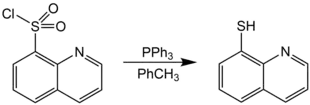 | |
| Names | |
|---|---|
| Preferred IUPAC name
Quinoline-8-thiol | |
| Other names
8-Quinolinethiol Mercaptoquinoline Thiooxine | |
| Identifiers | |
3D model (JSmol) |
|
| ChemSpider | |
PubChem CID |
|
| UNII | |
CompTox Dashboard (EPA) |
|
| |
| |
| Properties | |
| C9H8NS | |
| Molar mass | 162.23 g·mol−1 |
| Appearance | Colorless crystaline powder |
| Melting point | 58.5 °C (137.3 °F; 331.6 K) |
| Boiling point | 296 °C (565 °F; 569 K) |
Except where otherwise noted, data are given for materials in their standard state (at 25 °C [77 °F], 100 kPa).
Infobox references | |
8-Mercaptoquinoline is the organosulfur compound with the formula C9H7NSH. It is a derivative of the heterocycle quinoline, substituted in the 8-position with a thiol group. The compound is an analog of 8-hydroxyquinoline, a common chelating agent. The compound is a colorless solid.[1]
Preparation
Quinoline reacts with chlorosulfuric acid to form quinoline-8-sulfonyl chloride, which reacts with triphenylphosphine in toluene to form 8-mercaptoquinoline.[2]
References
- ↑ Fleischer, Holger "Structural chemistry of complexes of (n - 1)d10nsm metal ions with β-N-donor substituted thiolate ligands (m=0, 2)" Coordination Chemistry Reviews 2005, volume 249, pp. 799-827. doi:10.1016/j.ccr.2004.08.024
- ↑ Rao, Heng; Yu, Wen-Qian; Zheng, Hui-Qin; Bonin, Julien; Fan, Yao-Ting; Hou, Hong-Wei (2016). "Highly efficient photocatalytic hydrogen evolution from nickel quinolinethiolate complexes under visible light irradiation". Journal of Power Sources. 324: 253–260. Bibcode:2016JPS...324..253R. doi:10.1016/j.jpowsour.2016.05.095. ISSN 0378-7753.
This article is issued from Wikipedia. The text is licensed under Creative Commons - Attribution - Sharealike. Additional terms may apply for the media files.
